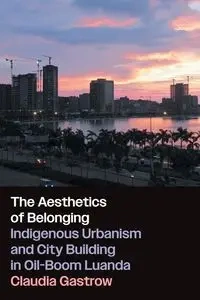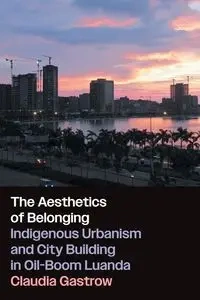The Aesthetics of Belonging - Claudia Gastrow
The Aesthetics of Belonging - Claudia Gastrow
- Indigenous Urbanism and City Building in Oil-Boom Luanda
AutorzyClaudia Gastrow
The Aesthetics of Belonging explores the political significance of aesthetics in the remaking of the city. Claudia Gastrow’s archival and ethnographic work, which includes interviews with city planners, architects, nonprofit leaders, and urban dwellers, shows how government infrastructure projects and foreign-inspired designs came to embody displacement and exclusion for many. This, Gastrow argues, catalyzed a countermovement, an aesthetic dissent rooted in critically reframing informal urbanism as Indigenous—a move that enabled the possibility of recognizing the political potential of informal settlements as spaces that produce belonging.
EAN: 9781469682181
Symbol
329GXV03527KS
Rok wydania
2024
Strony
242
Oprawa
Miekka
Format
15.6x23.4cm
Język
angielski

Bez ryzyka
14 dni na łatwy zwrot

Szeroki asortyment
ponad milion pozycji

Niskie ceny i rabaty
nawet do 50% każdego dnia
Niepotwierdzona zakupem
Ocena: /5
Symbol
329GXV03527KS
Kod producenta
9781469682181
Rok wydania
2024
Strony
242
Oprawa
Miekka
Format
15.6x23.4cm
Język
angielski
Autorzy
Claudia Gastrow

After centuries of colonial rule, the end of Angola’s three-decade civil war in 2002 provided an irresistible opportunity for the government to reimagine the Luanda cityscape. Awash with petrodollars cultivated through strategic foreign relationships, President José Eduardo dos Santos rolled out a national reconstruction program that sought to transform Angola’s capital into what he considered to be a modern, world-class metropolis. Until funds dried up in 2014, the program—in conjunction with sweeping private investments in real estate—involved mass demolitions of vernacular architecture to make way for high-rise buildings, large-scale housing projects, and commercial centers. The program thus underestimated the values enshrined in the materials and designs of Luanda’s existing “informally” constructed neighborhoods, or musseques.
The Aesthetics of Belonging explores the political significance of aesthetics in the remaking of the city. Claudia Gastrow’s archival and ethnographic work, which includes interviews with city planners, architects, nonprofit leaders, and urban dwellers, shows how government infrastructure projects and foreign-inspired designs came to embody displacement and exclusion for many. This, Gastrow argues, catalyzed a countermovement, an aesthetic dissent rooted in critically reframing informal urbanism as Indigenous—a move that enabled the possibility of recognizing the political potential of informal settlements as spaces that produce belonging.
EAN: 9781469682181
The Aesthetics of Belonging explores the political significance of aesthetics in the remaking of the city. Claudia Gastrow’s archival and ethnographic work, which includes interviews with city planners, architects, nonprofit leaders, and urban dwellers, shows how government infrastructure projects and foreign-inspired designs came to embody displacement and exclusion for many. This, Gastrow argues, catalyzed a countermovement, an aesthetic dissent rooted in critically reframing informal urbanism as Indigenous—a move that enabled the possibility of recognizing the political potential of informal settlements as spaces that produce belonging.
EAN: 9781469682181
Niepotwierdzona zakupem
Ocena: /5
Zapytaj o produkt
Niepotwierdzona zakupem
Ocena: /5
Napisz swoją opinię

